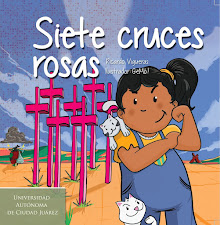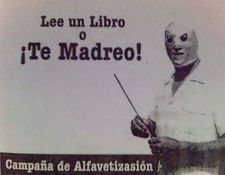Les comparto un análisis que Stephanie Sánchez realizó de mi novela Nuestra Señora de la Sangre. Stephanie es estudiante de la licenciatura en Psicología en el Community College de El Paso, Texas, y eligió la parte El primer vals para realizar un trabajo académico acerca de la representación del padre. Como pueden ver, el texto está en inglés. Yo no he querido ni podido traducirlo para esta ocasión. Si alguien no se maneja bien con este idioma, les sugiero acudir al botón de traducción automática de Google de este blog, que pueden encontrar en la barra de la derecha. No es lo ideal, pero menos da una piedra, ¿no creen?
Stephanie Sánchez
The Lost Daughter
Parenthood is one of the hardest struggles a person can face during his life. The responsibility of raising a child to a functional adult, especially a daughter, is often a task that can change a person. Many fathers deal differently with parenthood and how to relate to their daughters. In the book ‘Nuestra Señora de la Sangre’(‘Our Lady of the Blood’ ) by Ricardo Vigueras, the story title ‘El primer Vals’(‘The First Waltz’) tells the story about two fathers, Hector Quezada has reported missing his daughter Nictimine, while Lieutenant Lucas ‘El Raton’ Bauer is decide to attend the Quinceañera of his estranged daughter Cati. Analyzing the relationships between Lucas Bauer and Hector Quezada with their respective daughters, can show how much a Father figure –absent or over doting- can affect the psyche of a young girl.
The story introduces Lieutenant Lucas Bauer, better known as ‘El Raton’(The Mouse), during an arrest, where one his ex-wife brother informs him that Cati, his daughter whom El Raton has long lost touch but still paying financial support for her, is going to celebrate her Quinceañera. Not long after, Captain Adán ‘Blind Horse’ Nebreida ask him for his help in a case. Nictimine Quezada, the beloved daughter of the rich and known Hector Quezada has gone missing the morning after her own fancy Quinceañera. During the case, El Raton makes a horribly attempt to talk to Cati that fails in the worst way. With the information of and ex-captain now in charge of a criminal syndicate and some case of unorthodox way of getting information, they found Nictímene in the forest, surrounded by owls. She had run away for being a ‘bad daughter’ to her father, implying that Hector and Nictímene had sexual relationship the night of her Quinceañera. In the end, El Raton attends the Quinceañera of her own daughter, determined to have a waltz with his daughter, willingly or force. His presence bring troubles during the party, as his ex-wife La Chata accuses him of being a murderer of their youngest son when they were married, and Cati can’t bring herself to even talk to him, El Raton leaves the party in drunken numbness.
The two father presented in the story differs heavily, each men take Fatherhood in a different perspective, Ford explained that “… fatherhood may be a catalyst that stimulates enough crises to achieve identity. In fact, many have called the transition to fatherhood a crisis.”(285) Society has always relay the idea that men view children and fatherhood primarily as nothing but responsibility and obligation, but there a rising trend where there are men who emphasize the role of children as a source of meaning, happiness, and stability. In psychology, according to these scholars, what is important to the children in the long run and what most heavily affects children’s current and future behavior is the long term parent ‘residue’ within the children that is encapsulated within the children’s retrospective perceptions of their parents (Allgood 97). The father-daughter dyad is often overlooked when compared to the father-son or mother-daughter dyad. However, research shows that fathers are very influential in all areas of a woman's life, including self-esteem, interpersonal relationships, and personal achievement. Meaning a father figure can affect the outcome of a child’s future, whatever the father is aware of his influence on the child. Father’s involvement in their daughter life have a moderately strong positive relationship with the self-esteem of emerging adult daughters, a good relationship not only helps defines the daughter’s growth in confidences, as they learn confidence in doing rather that dialogue, they learn confidence to stand up for themselves and taking more risks. But also helps the men find confidence to be an authoritative figure, as someone their family can rely on him. Thus, if a young adult daughter perceived that her father was highly involved in her life, then that father’s impact on his daughter is a consequence of her perception of high involvement– independent of the accuracy of that perception (Finley & Schwartz, 2004)
There is nothing wrong with arguing that a strong father-daughter relationship is important, but there’s something weird when you elevate the father-daughter relationship above these others and start arguing that fathers and daughters should find in each other what they would otherwise go looking for in sexual and romantic relationships. Father-daughter incest is of particular importance because of the highs incidences and specific family dynamics (Dechesnay 392). In the story ‘El Primer Vals’ Hector Quezada is presented to the readers as a man of money, recognized in the Country as one of the richest men. Since the start Vigueras established that Hector Quezada adores Nictímene to the point he set no limits to the extravagance of his daughter’s party, getting her every whim. Hector Quezada is an overloving father, heavily involved in her daughter’s life, the protagonists Blind Horse and El Raton doesn’t concentrate much on this fact, so the readers and the protagonists themselves doesn’t realized the disturbing extent of that love until the very end when they find her living in a forest clearing for several days now, her only interaction are the owls around her and an old ‘half-retarded’ man that had been feeding her.
One can argue that the incestuous tones can be found when one realizes Hector Quezada seems to love more his daughter rather than his sick wife. Incest and its origins can be seen when the father start using his daughter as medium to his repressed emotions and sexual attentions, usually because there is a rift in the matrimony, in this case the long-life sickness that Hector Quezada wife’s suffers if the catalyst. Popular opinion says that only crazy people or the undereducated are the ones to commit incest, but this is a common misconception of the public. There appear to be two main family types in which incest occurs most regularly: the dysfunctional family and the superficially "normal" family. The dysfunctional family is characterized by problems spanning generations, relatively low socioeconomic standing, marginal functioning of individual family members, and the family as a whole (for example, drug or alcohol abuse). The superficially normal family appears to be solid and well-functioning. The parents have usually been in a long-term marriage. They are socially and financially stable, and seem well-respected by the community. Typically the family follows the traditional model of the husband as "head of the household" and the wife as subordinate. The family, however, is not as stable internally as it appears to be on the surface. The parents often lack the emotional capacity to adequately nurture one another, much less their children. As a result, both are emotionally needy and impoverished, perhaps due to the abusive upbringing of one or both parents. Over time the parents become estranged from one another, not only emotionally but also sexually. Sometimes they develop work schedules that allow them to avoid interacting with one another on much more than a superficial level.
During a dialogue with Blind Horse and Nictímene, the reader can find there some incestuous tone in the relationship with Hector Quezada and his daughter, but it seemed to never cross the line to sexual intercourse until the Quinceañera; a Quinceañera, is a coming of age party in Latin America culture, where a girl becomes a woman, Hector Quezada explain this to Nictímene, then culminates to sexual activity between them. This causes Nictímene to feel a huge amount of guilt, as she explain to Blind Horse “… -Cuando se marchó- prosiguió sin acritud- sentí mucha vergüenza por no haber sido Buena hija. Una buena hija no oblige a su padre a comportarse así” (Vigueras 248). Many psychologists say that the amount of love daughters receive from fathers can impact their mental health, and that a daughter's self image can be molded by the way her father responds to her. Nictímene believes herself responsible for attracting her father in an intimate way, which is a very real problem in real life cases. Children and young adults tends to blame themselves when parents have marital problems or overall tension in the household. Parent-child incest, which in most cases means father- or stepfather-daughter involvement, is consistently reported as the most damaging type of incest, while the effect of these behaviors is strikingly different depending on how coercive they are and on the relationship of the people involved. The effect of incest in teenagers tend to be more destructive, as they compare their situation with the rest of their peers. Psychologist Scott L. Ronald explains “The adolescent daughter's depression may increase when she realizes how strongly incestuous behavior is condemned by others .The depressive characteristics may result in self-destructive tendencies, such as suicidal, runaway, and truancy patterns” (252). Guilt and shame affect the survivor's self esteem, further the confusion about issues of guilt and responsibility develop if the child experienced sexual pleasure or gained a sense of personal power during the incest. While guilts is the sense that one has done something wrong which can be repaired, 'shame' is felt when there is something wrong with the self and there is nothing that can be done about it; shame is experienced as an inherent feeling of defectiveness as a human, as a daughter. Women buy the myth of being an object of perpetual youth, docility and sexual allure. As such, they become a personification or reflection, a passive servant, or an object helplessly absorbed in the father. Through unconscious adoration and idealization, a daughter becomes buried in the father's skin and acts against herself.
In the other side of the specter we have El Raton, a sordid man, frequent client of prostitutes and a drunk, since the tragic death of his son Lucas and the divorce, he had no prior relationship to his daughter Cati, even coming as a surprise that she was now old enough to celebrate her Quinceañera. The absence of their relationship is painfully obvious, El Raton, cannot find a way to relate to his daughter emotionally, the gap between them too large to rift; but still feels a kind of claim to her, especially in this event when she turn into a ‘proper woman’. Western culture with its patriarchal heritage has silenced the daughter and worked against her accessing her full scope of energy. For generations, a daughter was regarded as the least important member in the family and suppressed. The daughter-father issues remain a dark terrain and their relationship relegated to the shadows. Cultural biases kept daughters docile and fathers untouched, as if they were not essential to their children's lives. In fact, a father wielded so much influence that a daughter did not question her role with him, and instead projected her disappointments and difficulties onto her mother, in another diminishment to the feminine. A father, wounded in his masculinity, lacks relatedness and cannot support his daughter, nor impart useful knowledge about life. He cannot meet her challenges to him and his immature attitudes falsely accentuate male dominance, a sense of fraudulence as an adult, a basic confusion and the need to control create tension and dissatisfaction, all bolstered by persona, and in this instance, false adaptation.
When you are frozen relationally, it is difficult to know your place and how to develop a healthy relationship because you are working from a point of need instead of working out of a position of co-equal power. Absent fathers are defined as those who do not interact with their children on a regular basis and consequently do not play a significant role in their development. Divorce, death and abandonment are all forms of absence but nevertheless affect female development differently (Krohn) Young women need men in their lives who value them as human beings. They need men who don’t show any sexual interest in them. If a girl does not have strong male role models, her only meaningful interactions with men might be solely based on sex. She may feel that her body is all she has to give to the world. The requirement for the father both to delight in his daughter's emerging sexuality and maturity, and to ruefully but steadily renounce his claim on her to continue to center her desire and admiration on him (Lichtenberg) Many men operate off of the premise that if they weren’t involved in their daughter’s life as she was growing up that it is too late to make a difference, absentee fathers haven’t been taught how to get in touch with the expression of their softer side and feel uncomfortable with tender feelings. The trust between a daughter and her absentee father is one of the hardest relations to re-build considering one of the most important factors determining how close a father and his children become is how much the mother allows him to share in the parenting. Similarly, in the case of divorce, the mother often turns daughters against fathers. Understandably, daughters raised under such circumstances later tend to have great difficulty establishing trust in paternal figures.
Overall both ends, whenever over affection or the lack of it, can deeply mark or damage a young girl’s psyche, the daughters of such fathers often arrive in analysis with a façade of self-sufficiency Why does it matter if fathers and daughters generally do not have as communicative, as involved, or as close a relationship as mothers and daughters? It matters because fathers generally have as much or more impact than mothers on many aspects of their daughters’ lives, the father has the greater impact on the daughters’ ability to trust, enjoy, and relate well to the males in her life. Until recently, a rather strange status of silence surrounded the daughter-father relationship and perpetuated sealing off with painful, traumatic limiting and dictatorial natures of their connection. We might ask how much the prevailing attitudes, determined as normal, perpetuate restrictive ideas and set up conflicts for men and women. The fact that both daughter and father are separate yet linked comes from resolving dilemmas while holding the tension of their opposition is enough to raise the question if family dynamics should be reconsider.
Annoted Bibliography
Allgood, Scot M.Beckert, Troy E.Peterson, Camille. "The Role Of Father Involvement In The Perceived Psychological Well-Being Of Young Adult Daughters: A Retrospective Study." North American Journal Of Psychology 14.1 (2012): 95-110. Psychology and Behavioral Sciences Collection. Web. 2 Dec. 2013. Journal about the effects on the Daughter in an Father-Daughter relationship.
Dechesnay, Mary. "Father-Daughter Incest: An Overview." Behavioral Sciences & The Law 3.4 (1985): 391-402. Psychology and Behavioral Sciences Collection. Web. Article about how incest is connected to the family and family members. Explains how incest it view in families and how can be consequences of certain member of a family.
Finley, G. E., & Schwartz, S. J. (2004). The father involvement and nurturant fathering scales: Retrospective measures for adolescent and adult children. Educational and Psychological Measurement, 64(1), 143-164. Study about the preliminary data for two fathering measures and assesses the extent to which young adult perceived their fathers.
Ford, Jeffrey J.Nalbone, David P.Wetchler, Joseph L.Sutton, Philip M. "Fatherhood: How Differentiation And Identity Status Affect Attachment To Children." American Journal Of Family Therapy 36.4 (2008): 284-299. Psychology and Behavioral Sciences Collection. Web. The study evaluates fathers' differentiation and identity status as predictors of their attachment to their children.
Krohn, Franklin B.Bogan, Zoe. "The Effects Absent Fathers Have On Female Development And College Attendance." College Student Journal 35.4 (2001): 598. Psychology and Behavioral Sciences Collection. Web. This paper examined the effects absent fathers have on their daughters' development and college attendance.
Lichtenberg, Joseph D. "Fathers And Daughters: A Discussion." Psychoanalytic Inquiry 28.1 (2008): 106-113. Psychology and Behavioral Sciences Collection. Web. Article presents of significant features of the relationships of fathers and daughters.
Scott, Ronald L, David A Stone. "Mmpi Measures Of Psychological Disturbance In Adolescent And Adult Victims Of Father-Daughter Incest." Journal Of Clinical Psychology 42.2 (1986): 251-259. Psychology and Behavioral Sciences Collection. Web An Academic Journal about the study of victims of incestuous relationship by her father. This helps to show the consequence in victims.
Vigueras, Ricardo. Nuestra Señora de la Sangre. Chihuahua: Instituto Chihuahuense de la Cultura, 2013.Print. The book narrates three cases that the captain police station of the fictional city Punta Loba, Adan Nebreaida, also known as ‘Blind Horse’ and his most trusted colleague Lucas Bauer, called ‘The Mouse’ must solve. The book presents three particular stories that serve as divider. In the essay will center on the third story, ‘El primer vals’ (The First Waltz).
































No hay comentarios:
Publicar un comentario